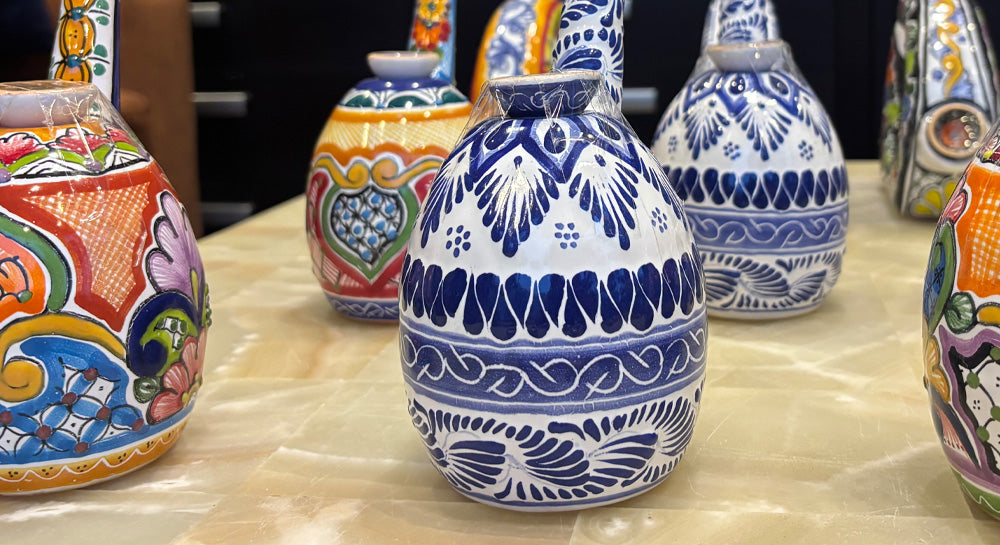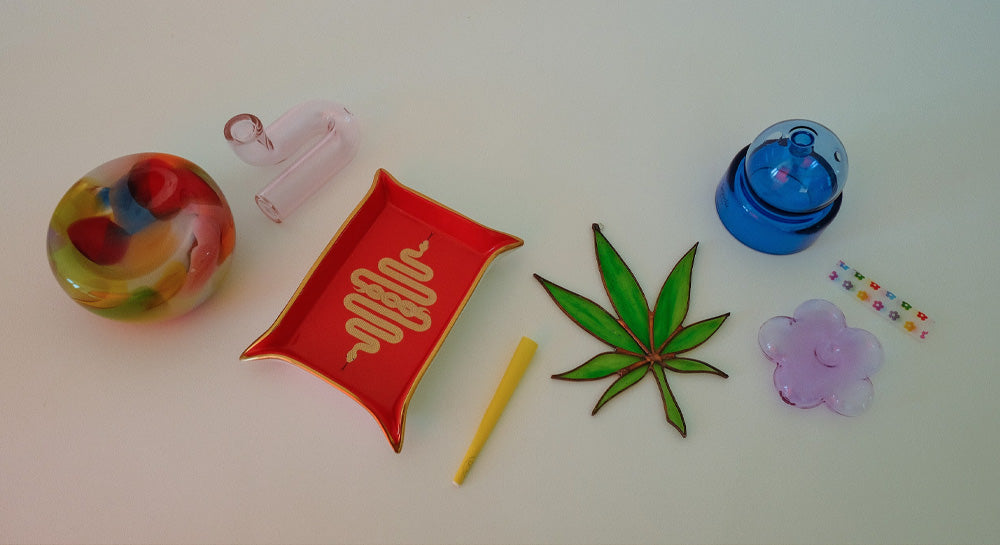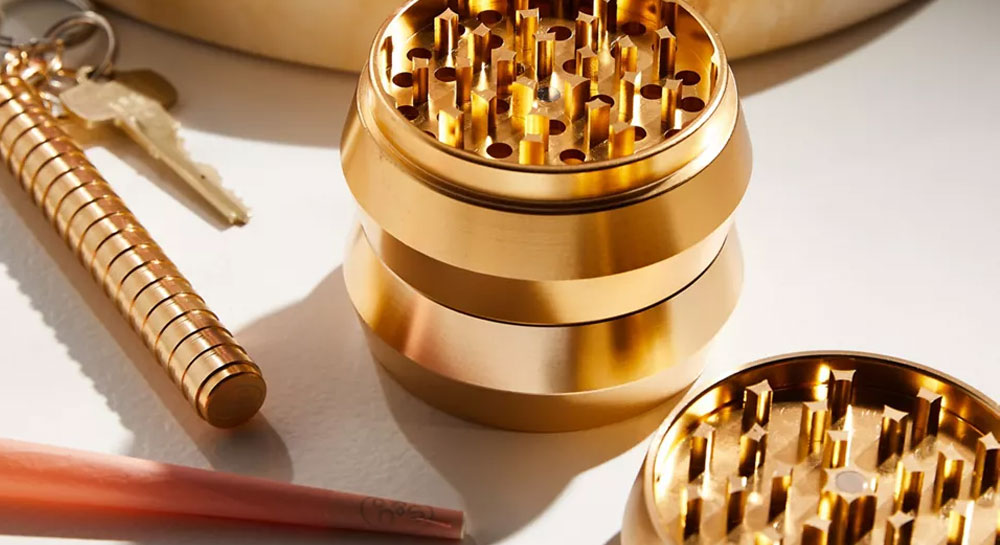
Macusi: A New Era of Cannabis Ritual
Macusi invokes the ancient bond between Mexico and weed, ushering in a new era. Available in the U.S. for the first time through The Flower Pot, Macusi crafts luxury smoking accessories.
The Talavera series from Puebla and the Xical collection from Estado de México are beautifully designed weed accessories. But most importantly, at the heart of every piece is a story.
Founder Christian Molina, affectionately known as Chris Macusi, grew up in Mexico City. Macusi’s unique pipes and weed accessories are expressions of Mexico’s rich heritage, embodying a deep connection to place, the natural world, and the artisans who shaped them. The work feels personal, spiritual, and proudly handmade.
Macusi redefines the cannabis ritual, paying tribute to the past while shaping the future. Through Macusi, Chris is rekindling the sacred relationship to plants and transforming narratives around cannabis by advocating for education, responsible consumption, and sustainable practices worldwide.
It all started with a stint in Colorado — a special trip that truly lit the spark.

Transforming Tradition, Reconnecting with Cannabis as Ritual
Living in Colorado cracked open a new world, one where cannabis isn’t hidden, but celebrated. Chris felt inspired and started collecting unique pipes that were more like works of art. It was then that the idea for Macusi began to percolate.
“I always wondered, if wine enthusiasts can enjoy a special glass, why do cannabis lovers have to hide?” he said.
That Colorado trip also reawakened a longing for home. When Chris returned to Mexico, he imagined smoking objects that could sit proudly on a coffee table — not tucked away in a drawer.
After being abroad, he felt a strong desire to reconnect with his roots. Born and raised in CDMX, Chris had always been fascinated by indigenous wisdom, even as a child.
He felt particularly connected to the Wixárika, an Indigenous group known for their vivid artistry, sacred relationship with plants, and spiritual communion with nature.
Also known as the Huichol, from the Sierra Madre Mountains, the group creates art that reveres nature: beaded masks and sculptures of animals like the blue jaguar, yarn paintings woven in reverence to agricultural deities, and depictions of tending corn as the source of life.
The Wixárika’s art reveals their cosmology, reflecting a different understanding of the world. Chris named Macusi in their honor, after the ancient word for marijuana in their native language.

Plants are tools for healing and spiritual connection, Chris said. It’s been a part of Mexico’s indigenous heritage for centuries.
An example is peyote, a hallucinogenic cactus that creates visions akin to communicating with the gods of nature. The blue deer, in particular, represents a spiritual guide who appears during ritual use of the plant.
“Cannabis is part of a personal and cultural ritual honoring the wisdom of our ancestors,” Chris said. Much like other sacred plants, cannabis has been used in ceremony and ritual to promote introspection, grounding, and connection to the natural world.
Handcrafted, Smokable Sculptures Uplifting Artisans
Chris invests countless hours researching and connecting with artisans in the states where Macusi operates. Currently, Macusi has partnered with ceramic artists in Morelos, Puebla, and Estado de México.
Each region in Mexico has its own unique ceramic traditions, often passed down through families. Many artisans have been practicing their craft for at least three generations.
From signature styles to local materials and ancestral firing methods, regional traditions influence every final design. “By fostering strong relationships with artisans, we create a sense of identity and purpose in every piece," Chris said. “In the end, it’s a true representation of Mexican art.”
One story that stands out is that of Don Arnulfo Vázquez and his grandson Jaime Vázquez, artisans from Tonalá, Jalisco — the heart of Macusi’s upcoming collection.
Don Arnulfo, now 93, has dedicated his life to working with clay, preserving traditional techniques passed down through generations. His hands carry decades of wisdom, embodying patience, ritual, and respect for the earth.
Jaime began learning from his grandfather as a child, captivated not only by shaping clay but also by the meaning behind each symbol and pattern. Each piece is decorated using natural pigments and traditional motifs inspired by Tonalá.
Today, they work together, blending Don Arnulfo’s ancestral knowledge with Jaime’s fresh perspective and curiosity. Each piece becomes a bridge between generations, Chris said — “a powerful reminder that tradition is not static; it’s alive, evolving, and deeply human.”
Clay from the Earth, Naturally Fired, Painted by Hand
Merging different types of clay, ancestral firing methods, and hand-painting techniques requires constant refinement.
Every clay is a unique blend of soil, water, minerals, and fire. Clay has played a crucial role in culture throughout Mexico’s history, with records showing Mayans and Aztecs using earthen materials hundreds of years ago.
Ancestral firing methods are distinct because they rely on natural, low-tech processes passed down for generations. Unlike modern kilns that use electricity or gas and allow precise temperature control, ancestral techniques often involve open-pit fires, wood kilns, or underground firing chambers.
“These methods are highly intuitive and require a deep understanding of the materials and the environment — including the type of wood, wind direction, and even humidity,” Chris explained.
Macusi's dedication to quality shines through a meticulous production process involving multiple firings, precise hand-painting, and careful finishing. Each step is necessary to achieve the perfect balance of aesthetics and function.
TALAVERA — Puebla
Tala·ve·ra / ˌtaləˈverə / plural -s: colorful glazed and decorated earthenware of Spanish or Spanish colonial origin.
Talavera is a type of majolica, an earthenware pottery finished with a specialty tin glaze. Though it originated in Spain, the tin-enameled earthenware has been a cornerstone of Mexican ceramics for centuries.
Known for bold, eye-catching, floral and natural patterns, this world-renowned pottery has become a symbol of Puebla kitchens and Mexico’s cultural history. Crafted in Puebla, Talavera pottery receives a Denomination of Origin certification recognizing its authenticity. Crafted in Puebla, Talavera pottery receives a Denomination of Origin certification recognizing its authenticity.
“We work closely with artisans to ensure that each piece not only reflects Macusi’s vision but also honors the heritage of the communities that create them,” Chris said.
XICAL — Estado de México
Xicalcoliuhqui is a common motif in Mesoamerican art. “Xical” refers to traditional Xicalcoliuhqui designs featuring stepped frets, geometric patterns, and interlocking motifs.
The Xical collection is a testament to Macusi’s dedication to artistry. It’s hand-painted by women artisans from Cerámica Orozco, a workshop with over 40 years of international recognition.
Each piece takes approximately 15 hours to complete, with 1–2 hours dedicated solely to hand-painting. The intricate patterns draw inspiration from a blend of Middle Eastern, Japanese, European, and Indigenous Mexican motifs.
The design is symbolic, showcasing the lifecycle of cannabis — starting with the germination of a seed.
“We’re always striving to return to the basics: our roots," Chris added. "Our designs are timeless, honoring Mexican heritage and appealing to cannabis lovers around the world.”
For Macusi, the Future is Bright
From stigma to supply chain challenges, it hasn’t been easy. Chris works to improve and shift the perception of cannabis, which remains a taboo for many in Mexico.
In 2021, he began collaborating with Dr. Mariana Hoyo, a leading specialist in endocannabinoid medicine who has worked with renowned cannabis scientists. Dr. Hoyo is widely recognized across Mexico and Latin America for her commitment to public health and well-being.
"I was looking for ways to help a cancer patient," Chris recalled. "From there, we realized the importance of educating people about cannabis medicine."
He’s currently developing workshops and webinars to share the plant’s medicinal properties, reduce risks, and promote responsible use. The in-person courses are being filmed now, with a digital launch planned.
The to-do list is long, though. It includes supporting Tuukul Consulting, which prioritizes education and awareness of personal use permits issued by Mexico’s Food and Drug Administration (COFEPRIS).
“A better understanding of cannabis in Mexico can come from knowledge of responsible consumption and legal frameworks,” Chris said.
Sustainability is also deeply ingrained in Macusi’s values, aligned with the growing shift toward eco-consciousness worldwide. Chris uses ethical practices to support artisans and minimize impact, like reducing packaging waste and opting for environmentally friendly materials.
“From using non-toxic glazes to eco-friendly packaging, we’re constantly looking for ways to lessen our footprint and ensure the products we create are as responsible as they are beautiful,” he said.
Beyond environmental considerations, Macusi actively contributes to community initiatives. For Chris, it’s about inclusivity: “All people must be respected and valued.” He advocates for queer rights and social justice, while raising funds for women, children, and rural neighborhoods.
Cannabis is always changing, and in the past few years, a more inclusive, sustainable, and conscious industry has been on the horizon. But we all know it takes work — and Chris remains steadfast.

Sharing knowledge benefits the whole cannabis ecosystem, Chris believes. Living by the phrase collaboration over competition, he works to uplift voices, traditions, and communities often overlooked in mainstream luxury markets.
By championing Mexican artistry and responsible consumption, Chris is carving a new path centering ritual, creativity, and cultural pride.
In 2025 and beyond, Macusi plans to expand its collections, introduce new artisan partnerships, and bring its educational initiatives to a global audience. Chris preserves Mexico’s artisan culture alongside daily efforts to reshape the perception of cannabis.
With each inhale, the brand invites collectors to slow down, connect with intention, and celebrate the beauty and healing properties of weed. Chris hopes to continue building partnerships to help responsible, inclusive, and ethical cannabis practices shine.
Macusi is set to leave an extraordinary mark on the industry, one handcrafted piece at a time. “As the first to open their doors to us," Chris shared," our partnership with The Flower Pot will always hold a special place in my heart and memory."
At its core, Macusi is more than a brand — it’s a movement. A celebration of culture. A reclaiming of ritual. A statement that cannabis can be sophisticated, safe, and deeply meaningful.
Say hello to Macusi. Welcome to your new ritual.
______
Macusi: A New Era of Cannabis Ritual
April 28, 2025
By Ashley Carucci





